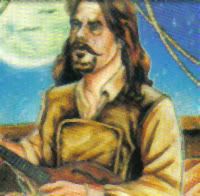|
Sid Meier's Pirates |
Historical Pirates |
Pirates In The Media |
Downloads |
Links |
Shop |
|
Historical Pirates
Pirates In The Media Downloads Shop Links Stories
|
|
Guillaume
Le Testu  Guillaume Le Testu was born at Le Havre in Normandy. Nationality being French and was active between 1551-1572 in the Caribbean. His exact birthdate is unknown, but is believed to be circa 1509. At Dieppe he studied navigation and was pilot of a French ship during an exploration mission of Brazil in 1551. Le Testu participated in an expedition which founded a colony near Rio de Janeiro in 1555 and in 1556 he was appointed royal pilot and presented to King Henry II a world atlas which consisted of 56 maps, which he drew. Le Testu's atlas included a southern continent which didn't exist, stating: "not imaginary even though no one has found it." During the 1500's France was in turmoil over religion. France had been catholic for centuries and in the 1520's Lutheranism entered the country. By 1534 Lutheranism threatened Catholicism and the crown adopted a policy of rooting it out, by force if necessary. Calvin (also a Frenchman), an outspoken man of protestant ideas whose ideas were expressed as Calvinism and by 1540 he had gained quite a bit of support for his cause. In the 1550's many of the Noblemen, being on the side of the Protesants fought against the the local churches and established the church. By this time France had effectively been split into two religious parties, the Catholics and the Calvinist (who were, by this time called the Huguenots). The tensions between the parties escalated until fighting broke out in the spring of 1562. The war was temporarily ended in 1563 when the Edict of Amboise was issued. It gave limited right of worship to the Huguenots. This was a deversion set up by the crown while they tried to gain support from the people. This was only temporary for the Catholics were about to enlist the aid of Spain in their cause. In 1567 warfare broke out again due to the fear of an alliance with Spain. It was during this time that Le Testu raided for the Huguenot side. He raided throughout 1567 and 1568 until he was captured by the Catholics. He was imprisoned for the next four years when King Charles IX, after being subjected to many pleas, allowed his release. The religious wars would continue long after Le Testu's death. Le Testu became captain of an 80 ton warship with about 70 men in his crew. Sir Francis Drake encountered Le Testu in April 1573 off Panama. Just why Le Testu was cruising around Panama is anyones guess. Spanish reports of the time stated that the French were planning a large expedition for 1572 but it is more likely that he was cruising on his own. Whatever his reason, Le Testu joined Drake in an attack on a mule train carrying treasure to Nombre de Dios. The attack was a complete success and the pirates loaded themselves with as much gold as they could carry, burying the rest. Le Testu's booty was around £ 20,000. Le Testu was wounded in the assault and choose to remain behind to regain his strength. Two of his men stayed with him. While resting, Spanish soldiers fell upon them and Le Testu was killed. Le Testu was beheaded and his head was put on prominent display in the marketplace at Nombre de Dios. |
